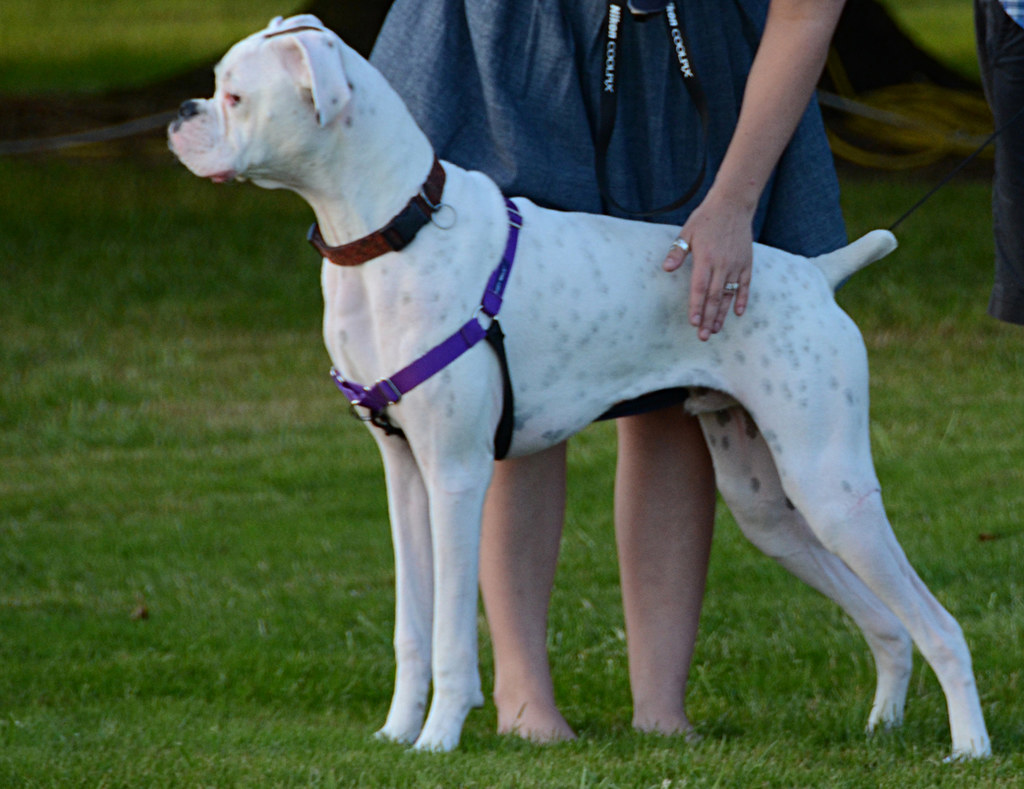If you’re in the market for a boxer, then look no further! Boxers are an excellent breed of dog to have as a pet and can be incredibly loyal companions.
With their strong loyalty and playful nature, boxers make great additions to any family home.
Everything a new owner of a boxer puppy or adult dog needs to know is included in this article. In addition, we’ll share some advice on how to zero in on the ideal puppy for your family’s needs.
Read on if you’re thinking of getting a pet.

Selecting The Right Boxer For You
Choosing the perfect pup for a forever friend can be an intimidating task. But it’s worth doing your research and selecting just the right pup for you.
Boxers are one of the most loyal breeds out there, but before deciding on adding this breed to your life, consider their exercise needs and socialization tips.
Boxers require quite a bit of daily activity to stay healthy and happy. They need regular walks or runs with plenty of playtimes in between – enough to tire them out by bedtime! Consider canine sports like agility and flyball if you lack the stamina (or yard) for more energetic games like fetch and hide-and-seek. Both your mind and body will get some much-needed exercise and excitement from participating in these activities.
Early socialization is critical when raising any puppy, especially boxers who thrive on human interaction. Introduce your new companion to other people, animals, sights, sounds, and smells while young; this helps them learn how to interact properly later in life and keeps aggression at bay.
Consistency in applying rewards for good behavior is essential for training obedient behavior in man’s best friend; treats can go a long way toward establishing trust.
So if you’ve got the energy and commitment necessary to keep up with these cuddly pups, then seriously consider bringing home a boxer – you won’t regret it!
What To Look For In A Breeder
When looking for a boxer puppy, finding a trustworthy breeder with ethical breeding practices is critical.
Ensure they provide health clearances and take measures to ensure their puppies are well-socialized.
Responsible breeders will also perform genetic testing on pups’ parents to reduce the risk of inheriting certain diseases or conditions.
Additionally, inquire about the temperament of both parents, as these tendencies can be passed down to the puppies.
Before purchasing a pup, ask if you can meet at least one parent dog and any siblings from previous litters.
You can use this to envision what your future pet might look like and act like when it’s fully grown.
If possible, visit the facility where the dogs are bred and make sure that it meets humane standards before deciding whether or not to buy from them.
Finally, research what’s involved in owning a boxer to know your pup’s space, exercise, nutrition, and healthcare needs.
Being informed about responsible ownership will help ensure that you and your new family member enjoy many years together!
Understanding Boxer Temperament
When looking for a boxer, it’s important to consider more than just the puppy’s cuteness. Breeder reputation and temperament evaluation are key when selecting your pup of choice.
The best place to start is by extensively researching the breeder you’re considering. Ask around the community about their experience with this particular breeder; word-of-mouth can be one of the most reliable indicators of their quality and care standards. You should also look up reviews online from other customers who have bought boxers from them in the past. If they seem reputable and trustworthy, you may want to move forward with exploring further options.
Breeders must also offer an accurate assessment of each pup’s personality traits so potential owners can make an informed decision before taking home a new friend.
The right temperature evaluation will provide insight into how playful or shy a dog might be and how easily trainable they could be depending on their age and level of socialization.
This helps ensure that any pet parent is fully equipped with all the information they need before making a commitment to bring home a boxer companion!
Essential Supplies For Your Boxer
When bringing home a new Boxer, there are some essential supplies you should have ready. These include food and water bowls, food appropriate to the size of your pup, treats for training purposes, and a collar or harness with an identification tag. Having these items ahead of time will ensure that your Boxer is comfortable in its new environment from day one.
Traveling to the vet and dog parks is important so your canine can get used to being around other animals and people. Visiting the vet periodically helps keep track of any health issues or vaccinations that need to be done; it’s best practice to stay up-to-date on all medical needs for your pet.
Taking them out to socialize at dog parks allows them to play and interact safely with others while getting exercise—plus they’ll love exploring the outdoors!
All these elements in place give your furry friend everything they need for a happy life together with you as their owner. Properly caring for your Boxer will help create an enjoyable relationship between you two filled with playful moments, cuddles, and unconditional love.

Training And Socialization
Training and socializing your Boxer is essential for an enjoyable, safe relationship between you and your pet. With the right techniques, it’s no more difficult than teaching a child how to act in public.
Like any pup, boxers have unique personalities but thrive on consistent rules and structure that help them understand what behaviors will earn them praise or correction. When introducing new commands, start small: basic housebreaking basics like sit and stay are good places to begin. Be patient as you work through these exercises; rewards-based methods are best when training a boxer since positive reinforcement has proven effective.
Make sure your dog understands what you’re asking him to perform before moving on to the next command in the series. Socialization tips are also important for creating a well-adjusted companion. Early exposure to other animals, people, and environments can prevent aggressive behavior from developing later in life.
This doesn’t have to be complicated – take time out of each day to introduce your pup to something new! Just remember not to overwhelm them; allow plenty of breaks so they don’t become overwhelmed or scared by anything strange or unfamiliar.
Grooming And Health Care
Caring for your Boxer is a full-time job. Grooming and health care are two of the most important aspects you should consider when bringing home one of these beautiful dogs.
When it comes to grooming, regular bathing is essential. Make sure you use a mild shampoo that won’t strip their coat or skin of natural oils. To keep them looking great between baths, brush their fur every few days and trim nails as needed.
Here’s a list of the bathing basics:
- Brush regularly
- Trim nails frequently
- Use only mild shampoo
Regarding health care, vaccinations are key to keeping your dog healthy in the long run. Speak with your veterinarian about what protocols they recommend for your particular pup. For example, some vaccines may be required more often than others, depending on where you live and how active your pup is outside.
Vaccination protocols can vary from region to region, so stay current on all recommended immunizations for your canine companion!
Common Health Issues In Boxers
As with any breed, knowing about common health issues in boxers is important. A healthy boxer is happy, so regular grooming and check-ups are essential for optimal well-being. As the saying goes, an ounce of prevention is worth a pound of cure!
Health concerns such as hip dysplasia, heart problems, and cancer should always be taken seriously by owners.
To ensure your pet stays safe and sound, ask your vet about genetic testing options to determine if hereditary diseases may present themselves down the line. Testing can also help you make informed decisions when considering a potential puppy or adult dog for adoption.
Caring for your four-legged friend requires more than love and attention; knowledge is also key. Researching potential health risks before bringing home a new addition can save both time and money in the long run – not to mention keep them fit, aggressive, and full of life!
Exercise Requirements For Boxers
Boxers have unique exercise requirements that should be considered when considering a boxer’s purchase. The intensity and duration of exercise for this breed are greater than other breeds, making it difficult to keep up with their energy level if not properly exercised.
Exercise intensity for boxers needs to be moderate to high to keep them healthy and happy. Taking your Boxer on long walks or jogs is an excellent way to meet their need for more intense physical activity. Playing fetch or engaging in agility training are two other enjoyable methods to ensure they get enough exercise.
Regarding exercise duration, boxers require around 30 minutes per day of physical activity. This could include any combination of walking, running, swimming, playing games, etc., as long as they’re getting enough exercise each day.
Suppose you’re unable to provide this much daily activity for your Boxer. In that case, you may look into dog-walking services or doggy daycare centers where they will get plenty of playtime and socialization with other dogs.
Overall, owning a boxer requires commitment from the owner because these active pups need regular and consistent exercise to remain healthy and content. With proper dedication, however, owning a boxer can be extremely rewarding!
Feeding Your Boxer
Feeding your Boxer is an essential part of keeping them healthy and happy. Proper nutrition can help optimize your pup’s physical, mental, and emotional well-being. If your dog has food sensitivities, you should know about them before making a food purchase.
Here are some tips for feeding your Boxer:
- Invest in high-quality kibble that contains natural ingredients such as chicken, fish, vegetables, and fruits.
- Avoid artificial preservatives and additives since this could disrupt their digestive health over time.
- Speak with a veterinarian about proper portion sizes for your pup based on breed, age, and activity level.
Giving your Boxer the correct amount of balanced nutrition will ensure it has enough energy for daily activities while helping promote a long life expectancy free from diseases caused by poor diet or malnutrition.
Common Behavioral Problems
As the old saying goes, “You can’t teach an old dog new tricks.” However, when it comes to boxers for sale, a few common behavioral problems may arise.
One of those issues is barking. This can be incredibly frustrating and cause distress both for the Boxer and its owners. Fortunately, solutions do exist, one of which is positive reinforcement. You will see results in your pup’s behavior over time through consistent use of verbal commands such as ‘No bark’ or ‘Quiet’ and rewards like treats or praise for following them. Additionally, providing ample exercise opportunities such as walks or playtime helps to curb excessive barking by tiring out the Boxer physically and mentally.
Another issue with boxers for sale is aggression towards other animals or people. Again, this problem can often be resolved through proper training, discipline, and the positive reinforcement techniques mentioned above. It’s important to remember that punishing a boxer after being aggressive won’t help solve the problem; instead, it could just make things worse by causing more stress on the animal while reinforcing bad behaviors. If a situation becomes too much to handle alone, seeking assistance from a professional trainer might be advisable.
In order to ensure that a newly adopted boxer has all of the best chances at success in their future home environment, it is essential to address any potential behavioral issues right away before they become larger problems down the road. With patience and consistency applied each day consistently, plus plenty of love and affection given freely throughout, it should not take long until good habits have been formed!
Caring For An Older BoxerCaring for an older boxer requires a few different considerations than a younger dog’s. It’s important to remember that they may have special needs due to aging and should be cared for accordingly.
To keep your older Boxer healthy and happy, it is essential to provide them with plenty of exercise and bonding time:
- Take regular walks or trips to the park; your pup will enjoy getting outside and having fun!
- Make sure to take some extra time for playtime each day – this can help strengthen the bond between you two.
- Keep up with any medical treatments your vet recommends; older dogs may require more attention and care.
Overall, providing proper care for an older boxer doesn’t have to be difficult if you remember that their needs will likely differ from those of a younger canine companion. With plenty of love, patience, and appropriate attention, you can ensure your beloved pet enjoys its senior years in comfort and contentment.
Finding Boxer Rescue Organizations
Searching for a boxer for sale can be an intimidating process. With the right information, however, it doesn’t have to be.
Whether you buy from a breeder or rescue organization, understanding the adoption process is key to finding your perfect pup.
In addition to providing medical treatment, socialization, and training, many rescue groups are committed to finding forever homes for boxers.
Many of these rescues offer guidance through the adoption process – including application requirements, home visits, contracts, etc.
When picking the proper dog for you, they may frequently provide you advice on what breed would go best with your routine.
The journey toward finding the perfect companion may not always be easy, but it’s worth taking the time to research breeders and rescue organizations thoroughly before making any decisions.
Knowing all your options will ensure you find a happy, healthy boxer puppy that fits perfectly into your family dynamic!
Cost Of Owning A Boxer

Now that you know about the various rescue organizations and accreditation standards, it’s time to discuss the cost of owning a Boxer. Every pet owner should know the financial commitment of caring for their furry friend. From vet visits to food expenses, there are many things to consider before making such an important decision.
Consider these considerations as you calculate how much cash you’ll need to buy your new puppy:
- Food: Boxers can eat up to two cups of high-quality dry kibble daily, depending on age and size. It is also recommended to feed them wet or raw food occasionally. In addition, make sure they always have access to fresh water throughout the day.
- Treats: Treats aren’t necessary, but most owners like spoiling their pup occasionally! Make sure treats don’t account for more than 10% of their daily caloric intake, though.
- Veterinary Care: Regular check-ups are essential for any dog breed, including boxers, to ensure good health and prevent diseases. Additionally, vaccinations and flea/tick medication may be needed depending on where you live and other environmental factors.
- Grooming Expenses: Brushing your Boxer’s coat once or twice a week will help reduce shedding while keeping them looking clean and shiny all year round! You can do this at home or take them to a groomer every few months if desired (which may come with its own set of costs).
Owning a Boxer isn’t cheap; however, when managed responsibly, they provide so much love and joy, which makes it completely worth it! After thoroughly considering all these points, decide whether taking on a boxer is right for you financially and emotionally – then get ready for lots of puppy kisses!
Questions To Ask A Breeder
When considering a boxer for sale, it’s important to understand the breeder you’re purchasing from. Over 40% of dogs in the United States are estimated to be purchased from breeders rather than adopted through shelters or rescue centers. Interviewing breeders and asking the right questions can help ensure your new pup is coming from a responsible breeding program.
First, ask about their experience with boxers and what kind of health testing they do on both parent dogs before breeding. Responsible breeders will have detailed records on their puppies’ parents, including genetic tests such as hip dysplasia screenings and eye exams. They should also be able to provide documentation showing up-to-date vaccinations for all pups and adults in their care.
It’s important to ensure the breeder has given plenty of socialization opportunities to their puppies before bringing them home. Ask how often they interact with each puppy and if they offer behavioral training services such as crate training tips or obedience classes.
A good breeder will know their puppies well enough to answer these questions confidently.
Ultimately, taking time to research reputable breeders who practice responsible breeding practices helps ensure you’ll get a healthy dog prepped for success in his new home!
Finding Boxer Puppies For Sale
Finding the perfect Boxer puppy for sale can be a daunting task. It’s important to take your time to make sure you find a reputable breeder and that the pup is healthy, well-socialized, and ready to join your family.

Some suggestions for getting going are as follows.
- Research breeders online – Look for customer reviews and accreditation from organizations like American Kennel Club or National Breed Clubs.
- Ask around – Reach out to friends who have bought puppies and seek their advice. Local dog rescue shelters may also be able to recommend good breeders with available pups.
- Visit the breeder – Make an appointment to visit the breeder of your chosen pup in person so you can evaluate them firsthand and ask questions about their care practices, health records, etc.
- Choose carefully – Carefully consider all aspects of each puppy’s personality before making your final selection; this helps ensure that the pup you bring home will fit into your lifestyle perfectly!
Once you’ve found a reliable breeder, it’s time to select your new furry friend! Be patient throughout the process, and remember that taking these extra steps upfront can help ensure that you and your new pup will be happy together for many years ahead.
Frequently Asked Questions
How Should I Introduce My Boxer To Other Pets?
Introducing a new boxer to other pets can be a tricky task. According to experts, 70-80% of pet owners report that their bonds with their animals are as strong as those with people!
To ensure your introduction goes smoothly for all involved, it is important to consider socializing tips and training requirements. Make introductions gradually by starting with brief meetings in neutral settings before allowing more interaction between them—this will help reduce any potential stress or anxiety from either species.
Training both cats and dogs on basic commands such as sit, stay, and come can also help foster positive relationships during interactions. With patience and proper guidance, you’ll soon have the perfect pet family.
What Is The Average Lifespan Of A Boxer?
Boxers typically live for 12 years, however, with the right care and socializing, they can live for up to 15!
Boxers are known for their loving personalities and loyalty; however, owners must factor in potential healthcare costs when considering buying one due to the breed’s tendency toward illness or disease.
With regular exercise and visits to the vet, your beloved Boxer can be well taken care of throughout its life.
How Much Exercise Does A Boxer Need Each Day?
A boxer needs significant exercise each day to stay healthy and fit.
Their high energy levels require at least an hour-long walk daily, but they can also benefit from playing fetch or other strenuous activities such as running with their human.
It’s important to select toys that keep them entertained while keeping their minds active during playtime.
Additionally, training tips should be followed so the dog learns how to interact appropriately with others around it.
Is It Necessary To Neuter/Spay My Boxer?
Neutering or spaying your Boxer is not a requirement, but it’s highly recommended. Getting your pup fixed can help with socialization and make training tips easier to follow.
You may eliminate two problems with one stroke: your dog will be better behaved and less readily distracted. Neutering is also a good idea because it improves health.
In a nutshell, it ends up being beneficial in the end.
What Is The Best Type Of Food For My Boxer?
When choosing the best diet for your Boxer, you’ll want to consider their socialization techniques and grooming requirements.
Boxers are active working dogs that need a high-quality diet with plenty of protein, carbohydrates, vitamins, and minerals. The food should also give them enough energy to keep up with their busy lifestyle.
Feeding your Boxer small meals multiple times a day can help maintain a healthy weight and reduce the risk of bloat, which is common in boxers due to their deep-chested physique.
When selecting a food for your Boxer, look for products that contain natural ingredients like whole grains, lean meats, and fresh fruits and vegetables.
Conclusion
When introducing your Boxer to other pets, taking things slow is important.
Start with a brief introduction and allow the animals to get used to each other in their own time.
Boxers can live up to 10-12 years, so providing enough exercise daily is essential for keeping them happy and healthy.
Ensuring your Boxer has a balanced diet that meets all its nutritional needs will go a long way toward helping it lead an active and fulfilling life.
Weighing on adopting instead of buying a Boxer? Today, think about adopting, helping out, or fostering a dog with Bone Voyage Dog Rescue.
In order to provide the love and care that each dog deserves while they wait for their permanent homes, we need your assistance. We want you to become a part of our community, whether your goal is to welcome a dog in need into your home, give of your time and talents, or foster a dog until they find their forever home.
Contact us at +52 3329718011 or send an email to [email protected] to learn more about our adoption, volunteer, and fostering opportunities. Together, we can improve the lives of these incredible pets!

